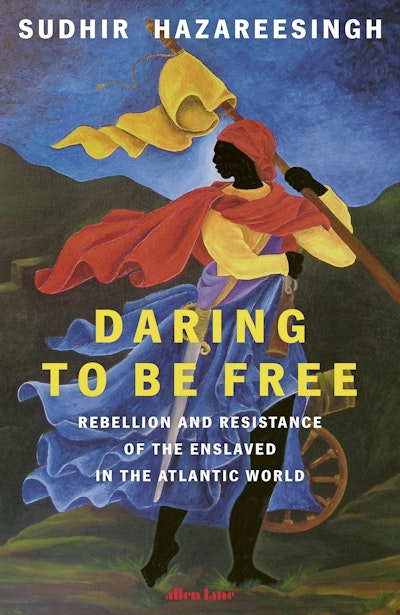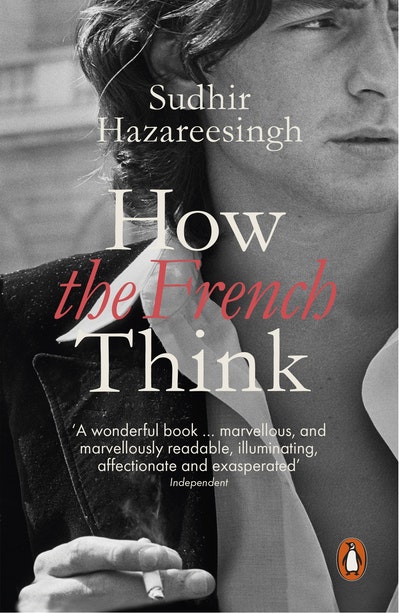- Published: 6 January 2026
- ISBN: 9780241606506
- Imprint: Allen Lane
- Format: Hardback
- Pages: 464
- RRP: $69.99
Daring to be Free
Rebellion and Resistance of the Enslaved in the Atlantic World
- Published: 6 January 2026
- ISBN: 9780241606506
- Imprint: Allen Lane
- Format: Hardback
- Pages: 464
- RRP: $69.99
Daring to be Free is a sweeping history of the rebellions, escapes, and everyday acts of defiance by enslaved Africans and their descendants across the Atlantic world. From African battlefields and maroon strongholds to the Haitian Revolution and spiritual resistance, Sudhir Hazareesingh restores the voices and strategies of those who fought relentlessly for autonomy, dignity, and liberation. Drawing on rich archival and oral sources, he reframes abolition as the achievement of the enslaved themselves — a centuries-long struggle driven by courage, solidarity, and an unyielding will to be free
Henry Louis Gates, Jr., Alphonse Fletcher University Professor, Harvard University
Daring to Be Free is a sweeping, powerful history of centuries of refusal and political imagination. Hazareesingh weaves together eloquent re-interpretations of famous revolts with a multitude of lesser-known, and revelatory, examples of resistance across the Atlantic World. He opens our eyes to the communities and worlds created by the enslaved, inviting us to craft a different future built on these unfinished struggles for true freedom
Laurent Dubois, author of <i>Avengers of the New World: The Story of the Haitian Revolution</i>
A truly sweeping and magnificent history of abolition and enslaved resistance ... Daring to Be Free proves without doubt that the first abolitionists were enslaved and captive Africans themselves. No other synthesis of transatlantic slavery’s ultimate destruction can match this one in terms of the period and geographical locales covered or the number and quality of sources, but more importantly, in terms of the author’s determination to highlight the agency and ingenuity of the enslaved people who, bracing every obstacle, ultimately brought the system of slavery to a grinding standstill
Marlene L. Daut, author of <i>The First and Last King of Haiti: The Rise and Fall of Henry Christophe</i>
A sweeping history of black resistance from 1500 to 1900 … Studded with novelistic vignettes of insurrection, it doubles as a brisk history of Atlantic slavery. Hazareesingh writes with a wry lucidity, [showing how] enslaved men and women fought their bondage long before enlightened philosophes in Parisian salons decried it … [the book is] enlivened with colloquialisms [and] succeeds on the strength of its remarkable cache of evidence
Pratinav Anil, The Times
[An] absorbing and revelatory history of black resistance to the transatlantic trade ... a marvel of historical analysis and research. Hazareesingh maintains that Enlightenment ideals alone did not abolish slavery, and shifts the focus away from Christian abolitionists who often derided African culture to the agency of Afro-Atlantic insurgents and conspirators. [He] emphasises the role played by women as disruptors and warrior figures in the cause of freedom
Ian Thomson, New Statesman
This stunning revisionist saga [is] a remarkable reorientation of the history of the modern world
Publishers Weekly
A much-needed and sure-to-be-influential addition to the literature of African enslavement
Kirkus Reviews
Hazareesingh rips away the screen of white saviorism to reveal a compelling history of enslaved people fiercely and collaboratively seizing freedom with their own hands
Lesley Williams, Booklist
quietly devastating ... Daring to Be Free is a powerful corrective to [the] white saviour myth. Drawing on previously neglected memoirs, interviews and oral traditions, its central argument is that enslaved people did not need western Enlightenment ideals to understand their predicament. Instead Hazareesingh details how resistance began in Africa itself with village militias, continued via slave ship mutinies and remained a constant threat on plantations from Barbados to Guadeloupe.
Irish Times
A masterclass in literary archaeology ... Daring to be Free restores agency to the rebels and fighters who take up their position front and centre in [this] bristling narrative. The geographical scope is as wide as the historical examination across four centuries, the focus extending from Haiti, Jamaica, Cuba and Brazil to the US, Mauritius and swaths of West and sub-Saharan Africa. Women, traditionally eclipsed in such histories, come to the fore as warriors, rebels and revolutionaries. [This is] a rich, powerful and groundbreaking history
Justin Marozzi, Financial Times
Daring to Be Free is Sudhir Hazareesingh’s second book-length reinterpretation of the politics and history of slavery. While his 2020 Black Spartacus showed how the Haitian revolt and its leader, Toussaint Louverture, drew inspiration from African traditions of revolt against slavery, Daring to Be Free uses this same frame to examine rebellions in the Americas, the Caribbean, and Africa. Hazareesingh doesn’t set out to claim that these revolts were responsible for the abolition of slavery, but rather that they explain the culture and politics that emerged in its wake, in much the same way that the French Resistance shaped postwar France. Almost every page is littered with fascinating facts or new ways of thinking about history and the world.
Jacobin, Books of the Year
Daring to be Free reconstructs the extraordinary sources of "fugitive resisters" to examine the crucial role that captives played, over centuries, in dismantling the transatlantic slave trade. If abolition was impossible without decrees by Western governments, Hazareesingh argues, it was unthinkable without enslaved peoples' own push for emancipation. Documenting diverse acts of rebellion from Africa to the Caribbean and the Americas, his book shows how guerrilla strategies - influenced by spiritual traditions and characterised by solidarity across social groups - were deployed from the earliest days of enslavement, and help to shape the ideological currents of autonomy and self-determination
The New Yorker
Hazareesingh [offers] a new intellectual and political perspective on the emergence of freedom in the modern world
Laurent Dubois, Atlantic





